With all that marketing data available you

would think that every company would be successful; unfortunately, sometimes they miss the mark. Chances are they weren't getting the right marketing data or they misinterpreted what they had. Let’s take a look at two technology related companies. One that read the data right and one that missed the mark.Apple, Inc. has created brand loyalty and great success through their marketing campaigns and product development. They have been able to do this for two reasons. One, they marketed their products and services as “easy to use”, making them an ideal choice for every age and every level of technology user. While this appears rather broad, they could not have focused on this avenue without getting the right marketing data. They were able to determine that the growing market of individuals and families wanted a product that was easier to use than a traditional PC and catered to the needs of a family, not a business. This led to the second reason for success. The data told them that, in the early days of home computing, most people considered computers “nerdy” and requiring training to use. Apple took this information and created an easy to use operating system built into a stylish product. As parents had kids and those kids grew up using Apple products and services, new generations knew little else. Thus, brand loyalty was born. Apple continues to be innovative, but maintains their original marketing strategy of easy to use and fashionable. The current data proves it’s still working.On the other hand, some businesses may be getting the right marketing data and not analyzing it correctly. Facebook is an example of this. They gain mountains of data on user patterns, demographics, user comments, and retail habits; however, with every innovation or change, they lose market share and frustrate users. Perhaps they just ignored “fans” frustrated over timeline, thought they knew better, or had too much invested to listen; but, over time this is causing the downfall of Facebook. Frustrated users visit less frequently, advertisers pull their ads, and revenues fall. Also, Facebook relies heavily on advertising to generate revenue. Companies placing their advertisements on the sidelines of the computer screen began getting less visibility as members started viewing Facebook on their mobile devices. Smaller screens and less power than a PC (or Mac) inevitably led to less ad space. If Facebook was getting the right data and paying attention to it, they may have seen it coming and altered their advertising format to maintain profitability. Of course, Facebook still has hundreds of millions of users and will probably be around for a long time, but it appears they do have issues when it comes to user data.For every business, in every industry, there’s tons of data available to make informed choices. Companies need to focus on getting the right data and analyzing it correctly to avoid business busting mistakes.
See mTab Halo in Action
Make smarter decisions faster with the world's #1 Insight Management System.




